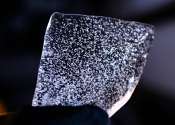Discovery of massive undersea water reservoir could explain New Zealand's mysterious slow earthquakes
Researchers have discovered a sea's worth of water locked within the sediment and rock of a lost volcanic plateau that's now deep in the Earth's crust. Revealed by a 3D seismic image, the water lies two miles under the ocean ...









